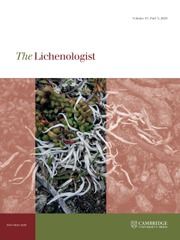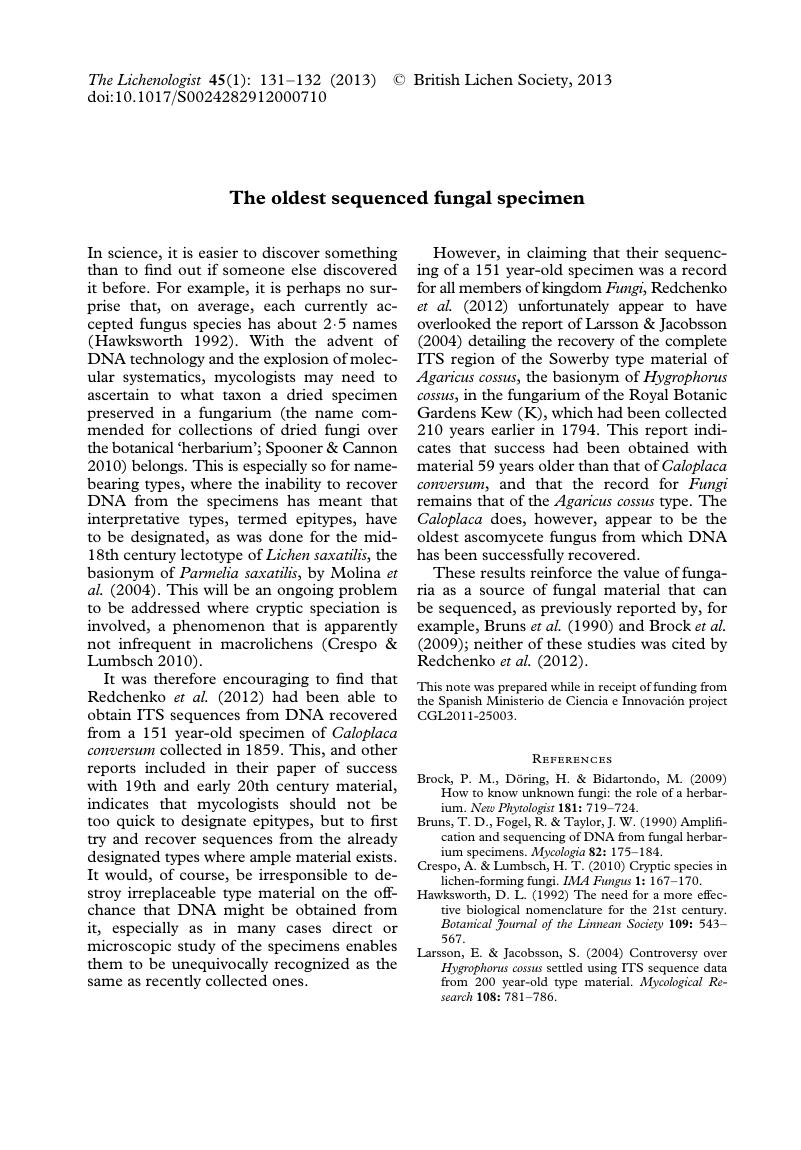Crossref Citations
This article has been cited by the following publications. This list is generated based on data provided by Crossref.
Ariyawansa, Hiran A.
Hawksworth, David L.
Hyde, Kevin D.
Jones, E. B. Gareth
Maharachchikumbura, Sajeewa S. N.
Manamgoda, Dimuthu S.
Thambugala, Kasun M.
Udayanga, Dhanushka
Camporesi, Erio
Daranagama, Anupama
Jayawardena, Ruvishika
Liu, Jian-Kui
McKenzie, Eric H. C.
Phookamsak, Rungtiwa
Senanayake, Indunil C.
Shivas, Roger G.
Tian, Qing
and
Xu, Jian-Chu
2014.
Epitypification and neotypification: guidelines with appropriate and inappropriate examples.
Fungal Diversity,
Vol. 69,
Issue. 1,
p.
57.
Jørgensen, Per M.
2014.
Notes on the new Example 9 in Article 9.8 of the International Code of Nomenclature for algae, fungi, andplants.
TAXON,
Vol. 63,
Issue. 1,
p.
132.
Firmino, André Luiz
Inácio, Carlos Antonio
Pereira, Olinto Liparini
and
Dianese, José Carmine
2016.
Additions to the genera Asterolibertia and Cirsosia (Asterinaceae, Asterinales), with particular reference to species from the Brazilian Cerrado.
IMA Fungus,
Vol. 7,
Issue. 1,
p.
9.
Yahr, Rebecca
Schoch, Conrad L.
and
Dentinger, Bryn T. M.
2016.
Scaling up discovery of hidden diversity in fungi: impacts of barcoding approaches.
Philosophical Transactions of the Royal Society B: Biological Sciences,
Vol. 371,
Issue. 1702,
p.
20150336.
Leavitt, Steven D.
Keuler, Rachel
Newberry, Clayton C.
Rosentreter, Roger
and
Clair, Larry L. St.
2019.
Shotgun sequencing decades-old lichen specimens to resolve phylogenomic placement of type material.
Plant and Fungal Systematics,
Vol. 64,
Issue. 2,
p.
237.
Balocchi, Felipe
Wingfield, Michael J.
Paap, Trudy
Ahumada, Rodrigo
and
Barnes, Irene
2022.
Pathogens of the Araucariaceae: How Much Do We Know?.
Current Forestry Reports,
Vol. 8,
Issue. 2,
p.
124.
Marasinghe, D. S.
Hongsanan, S.
Zeng, X. Y.
Jones, E. B. G.
Chomnunti, P.
Boonmee, S.
and
Hyde, K. D.
2023.
Taxonomic monograph of epifoliar fungi.
Fungal Diversity,
Vol. 121,
Issue. 1,
p.
139.
Bradshaw, Michael J.
Carey, Julie
Liu, Miao
Bartholomew, Holly P.
Jurick, Wayne M.
Hambleton, Sarah
Hendricks, Dylan
Schnittler, Martin
and
Scholler, Markus
2023.
Genetic time traveling: sequencing old herbarium specimens, including the oldest herbarium specimen sequenced from kingdom Fungi, reveals the population structure of an agriculturally significant rust.
New Phytologist,
Vol. 237,
Issue. 4,
p.
1463.



